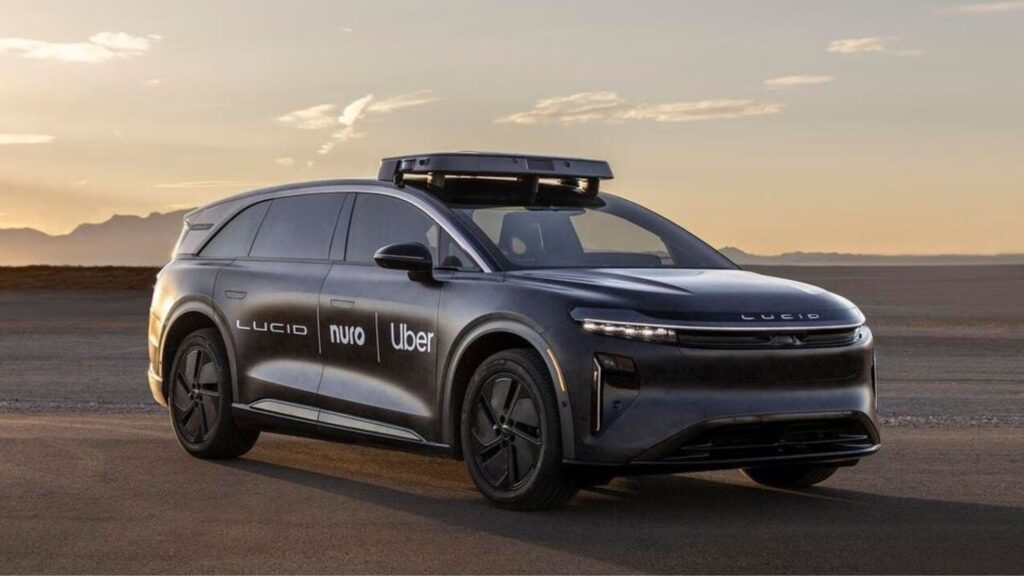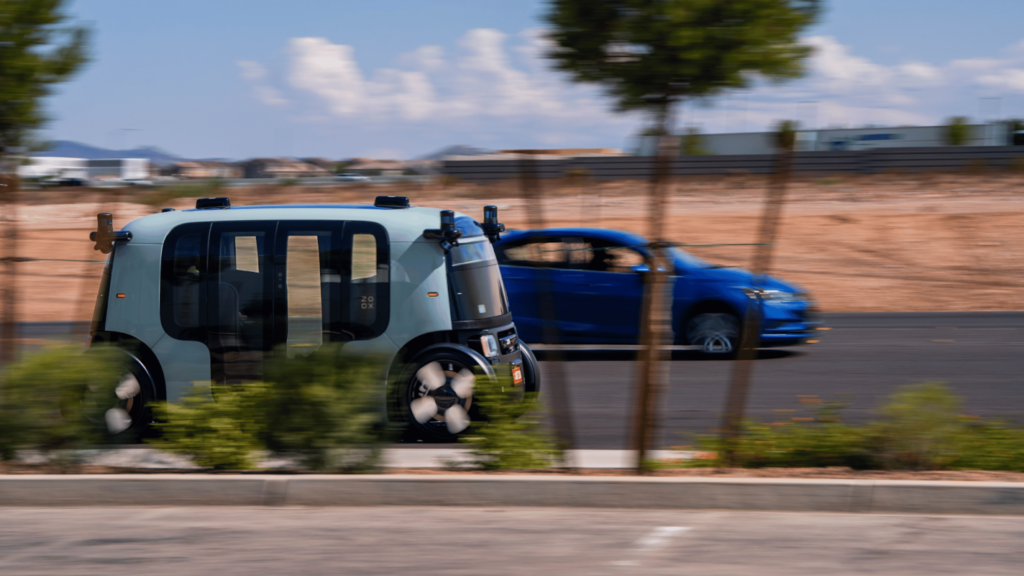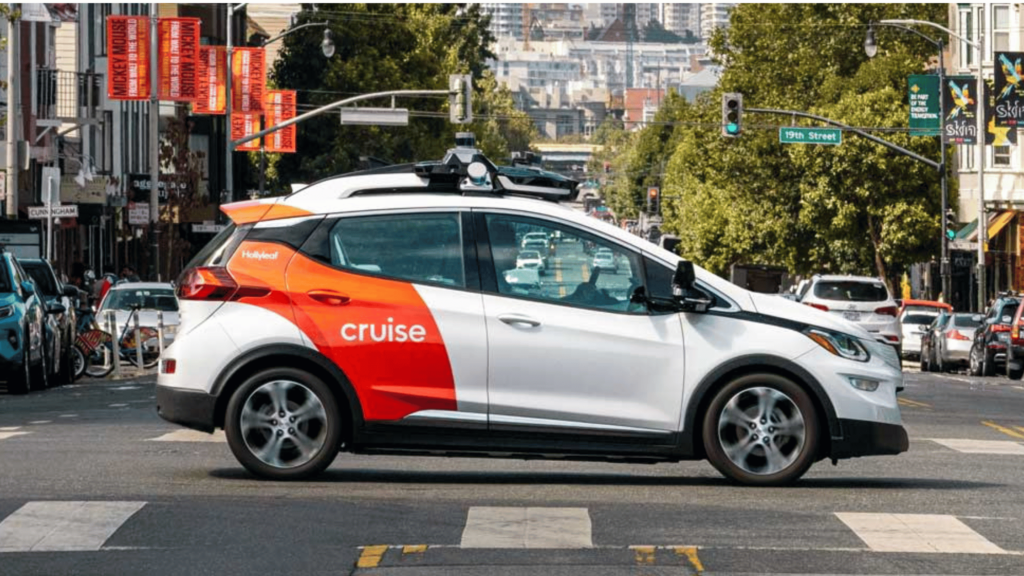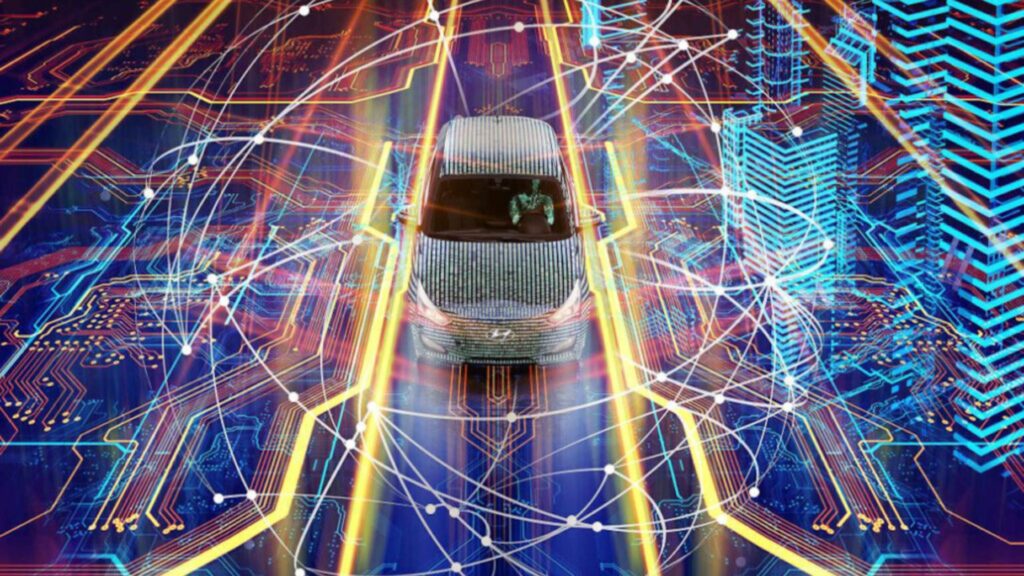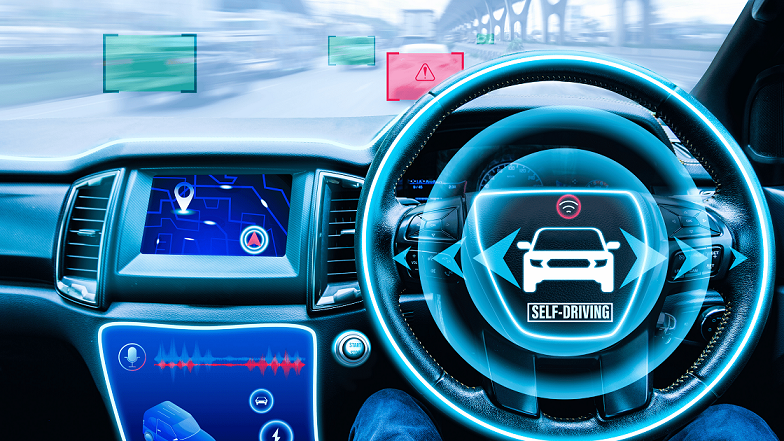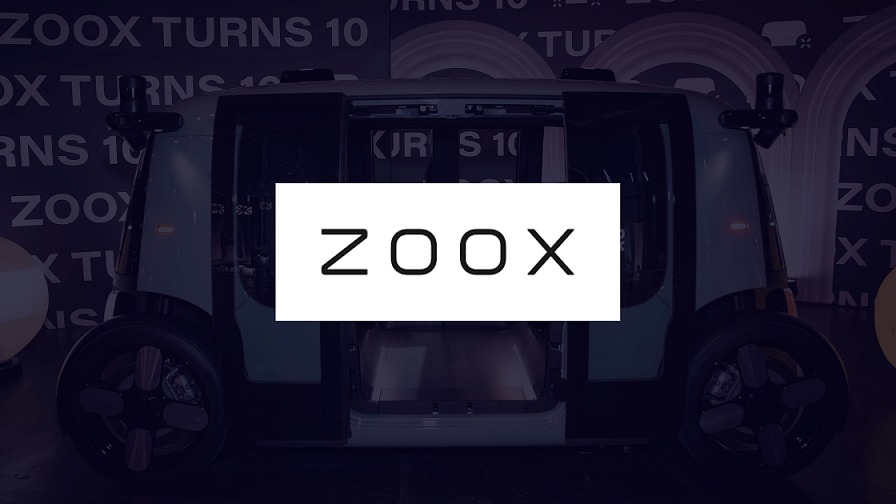Table of Contents
- Uber Technologies, Lucid Group, and Nuro have partnered to deploy over 20,000 autonomous Lucid Gravity SUVs as robotaxis on Uber’s platform, starting in 2026.
- Uber is investing $300 million in Lucid and a larger, undisclosed amount in Nuro, with a seat on Nuro’s board.
- The rollout begins in a major U.S. city in 2026, with plans to expand globally over six years.
- Nuro brings over 1.4M autonomous miles with zero at-fault incidents
In what could be a watershed moment for autonomous mobility, Uber has forged a significant partnership with electric automobile manufacturer Lucid Motors and robotics startup Nuro. The announcement was made in July 2025, as the three companies are coming together to create what could be the gold standard for robotaxi services.
According to the fineprint, we are expecting over 20,000 autonomous Lucid Gravity SUVs as robotaxis on Uber’s platform, starting in a major undisclosed U.S. city in 2026. Now here’s the interesting part: As part of the robotaxi deal, Uber is investing $300 million in Lucid and a significant sum in Nuro, signaling a new era where premium electric vehicles meet sophisticated artificial intelligence to deliver an unparalleled transportation experience.
Truth be told, the collaboration couldn’t have come at a more pivotal time, as the ride-hailing industry is now in a race to replace human drivers with SAE Level 4 cars.
Here are the three pillars of this robotaxi deal:
- Uber’s massive ride-hailing network and operational expertise
- Lucid’s luxury electric vehicle technology
- Nuro’s battle-tested autonomous driving capabilities.
The vehicles will be owned and operated by Uber or its third-party fleet partners, ensuring riders can access this premium service exclusively through the Uber app. The stock market responded positively to the news, with Lucid stock gaining 36% on Thursday following the announcement, indicating strong investor confidence in the partnership’s potential.
Financial Commitments of the Robotaxi Deal
- Uber’s Investment in Lucid: Uber is pouring $300 million into Lucid, a significant boost for the electric vehicle (EV) startup. This investment, confirmed by Lucid spokesperson Nick Twork, supports the production of Gravity SUVs tailored for autonomy.
- Investment in Nuro: Uber is also making a “multi-hundred-million dollar” investment in Nuro, described as “significantly more” than the Lucid investment, though exact figures remain undisclosed. As part of this, Uber will secure a seat on Nuro’s board of directors.
- Vehicle Purchases: Uber and its partners plan to purchase at least 20,000 Lucid Gravity SUVs, with the potential for more, separate from the $300 million investment. This order alone could be worth approximately $1.5 billion over five years, based on the Gravity’s starting price of $94,900.
Why It Matters
The Lucid, Nuro, and Uber robotaxi deal is a bold step toward making autonomous ride-hailing a reality at scale.
“Autonomous vehicles have enormous potential to transform our cities for the better,” said Uber CEO Dara Khosrowshahi. “We’re thrilled to partner with Nuro and Lucid on this new robotaxi program, purpose-built just for the Uber platform, to safely bring the magic of autonomous driving to more people across the world.”.
Meet the Players: Who Are Lucid, Nuro, and Uber?
Lucid Group: The EV Innovator
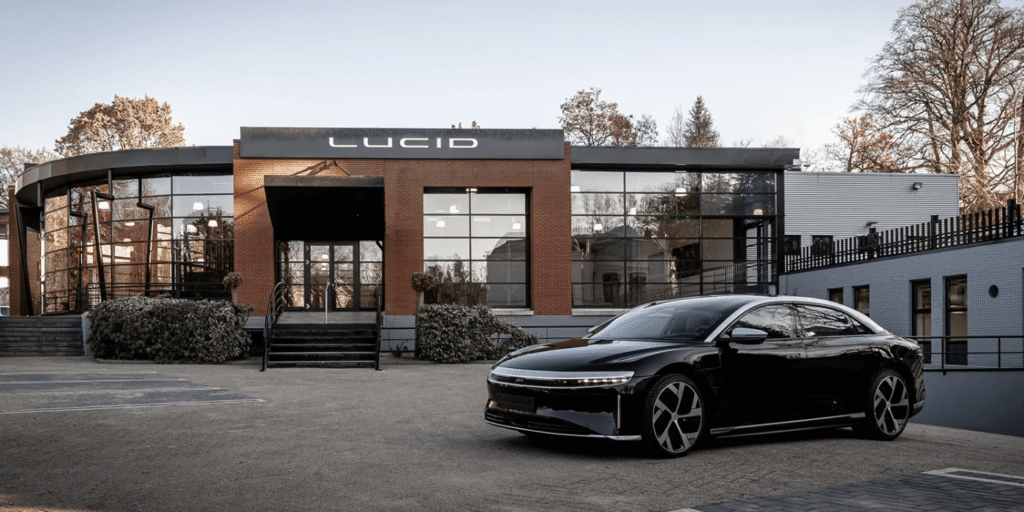
Lucid Group, Inc. (NASDAQ: LCID), founded in 2007 as Atieva, is a California-based electric vehicle manufacturer known for its focus on efficiency and luxury. Headquartered in Newark, California, Lucid has quickly risen as a formidable player in the EV market, often dubbed a “Tesla killer” for its ambitious goals.
Perhaps most impressively, Lucid Air Grand Touring drives 1,205 kilometers between St. Moritz and Munich without a single charging stop, earning the GUINNESS WORLD RECORDS™ title won by Lucid for the longest journey by an electric car on a single charge.
The Gravity SUV, introduced in 2024, offers a 450-mile range and spacious interiors, making it ideal for ridesharing.
Achievements:
- Production Milestones: Lucid delivered 10,000 Air sedans in 2024 and aims to deliver 20,000 vehicles (Air and Gravity) in 2025, bolstered by Uber’s order.
- Technological Edge: The Gravity features a fully redundant zonal architecture, designed with hardware redundancies for Level 3 autonomy, making it adaptable for Nuro’s Level 4 systems.
- Financial Backing: Lucid is majority-owned by Saudi Arabia’s Public Investment Fund (PIF), which holds a $4.29 billion stake as of March 2025, providing significant capital for growth.
“This investment from Uber further validates Lucid’s fully redundant zonal architecture and highly capable platform as ideal for autonomous vehicles,” said Lucid’s interim CEO Marc Winterhoff. “This is the start of our path to extend our innovation and technology leadership into this multi-trillion-dollar market.”
Nuro: The Autonomous Pioneer

Nuro, Inc., founded in 2016 by former Waymo engineers Jiajun Zhu and Dave Ferguson, is a robotics company specializing in Level 4 autonomous technology. Based in Mountain View, California, Nuro initially focused on zero-occupant delivery bots, operating in cities like Houston and Phoenix. After facing financial challenges, Nuro pivoted in 2023 to license its autonomous driving technology, the Nuro Driver™, to automakers and mobility providers. This shift extended its financial runway from 1.5 to 3.5 years.
Achievements:
- Proven Track Record: Nuro has operated driverless delivery vehicles for five years across multiple U.S. cities, accumulating real-world experience.
- Funding Success: The company has raised over $2 billion from high-profile investors, including SoftBank and Google.
- Rapid Integration: Nuro developed a prototype autonomous Lucid Gravity in just seven weeks, showcasing its engineering prowess.
“Nuro has spent nearly a decade building an AI-first autonomy system that’s safe, scalable, and vehicle-agnostic,” said Jiajun Zhu, Nuro’s Co-Founder and CEO. “By combining our self-driving technology with Lucid’s advanced vehicle architecture and Uber’s global platform, we’re proud to enable a robotaxi service designed to reach millions of people around the world.”
Uber Technologies: The Ride-Hailing Giant

Uber Technologies, Inc. (NYSE: UBER), founded in 2009, is the world’s leading ride-hailing platform, operating in 70 countries with an average of 34 million trips per day. Headquartered in San Francisco, Uber has expanded beyond ridesharing to include delivery (Uber Eats) and freight services. After a fatal accident in 2018 halted its in-house autonomous vehicle program, Uber shifted to partnerships with AV leaders like Waymo, Baidu, and now Lucid and Nuro.
Achievements:
- Global Scale: Uber’s platform serves millions daily, with 1.5 billion trips in Q2 2025 alone, according to its investor reports.
- AV Partnerships: Uber has agreements with 18 AV companies, including Waymo (operating in Atlanta and Austin) and Volkswagen (for ID.Buzz robotaxis in Los Angeles).
- Financial Strength: Uber’s market cap exceeds $150 billion, and it’s a top holding of Saudi Arabia’s PIF, with a $5.31 billion stake as of March 2025.
You May Also Like:
The Technology: How It All Comes Together
Lucid Gravity: The Perfect Robotaxi Platform
The Lucid Gravity SUV is the backbone of this robotaxi fleet. With a starting price of $94,900 and a 450-mile EPA-estimated range, it’s designed for high utilization and minimal charging downtime. Its redundant braking and steering systems, originally built for Level 3 autonomy, make it an ideal candidate for Nuro’s Level 4 technology. Lucid integrates Nuro’s hardware—LiDAR sensors, radars, and cameras—directly on its Arizona assembly line, ensuring seamless production.
Nuro Driver™: Level 4 Autonomy
Nuro’s Level 4 autonomous system, the Nuro Driver™, enables vehicles to operate without human intervention in specific conditions. It combines automotive-grade hardware with AI-powered software for reliability and scalability. Nuro is developing a comprehensive safety case, using simulations, closed-course testing, and supervised on-road testing to ensure the robotaxis operate safely across diverse environments. A prototype Lucid Gravity is already operating autonomously at Nuro’s Las Vegas proving grounds.
Uber’s Role: Platform and Fleet Management
Uber brings its global ride-hailing network and dynamic fleet management to the table. The robotaxis will be available exclusively on the Uber app, likely as a premium service akin to Uber Black, given the Gravity’s luxurious design. Uber or its partners, such as Alto or Avomo, will own and operate the fleet, ensuring maintenance and scalability.
Significance of the Deal
For Lucid
- Financial Boost: The $300 million investment and guaranteed order of 20,000 vehicles provide Lucid with critical capital and a stable revenue stream. This is especially vital as Lucid has faced losses and announced a one-for-ten reverse stock split in July 2025 to stabilize its share price.
- Market Expansion: The deal opens a new market for Lucid, positioning it as a serious contender in the autonomous vehicle space. “We’ve been chosen because of our EV technology leadership,” said Marc Winterhoff.
- Stock Surge: Lucid’s stock soared 36% on July 17, 2025, closing at $3.12, reflecting investor confidence in the partnership.
For Nuro
- Validation of Technology: The deal marks Nuro’s first major technology licensing partnership, validating its pivot to passenger AVs.
- Financial Runway: Uber’s investment extends Nuro’s financial stability, allowing it to scale its Level 4 technology.
- Board Influence: Uber’s seat on Nuro’s board strengthens their strategic alignment, fostering future collaborations.
For Uber
- Leadership in Robotaxis: The deal positions Uber as a central player in the autonomous vehicle market, competing with Waymo and Tesla. Uber’s partnerships with 18 AV companies underscore its strategy to become a “clearinghouse” for autonomous mobility.
- Cost Efficiency: Autonomous vehicles could reduce Uber’s reliance on human drivers, lowering operating costs and improving ride availability.
- Environmental Impact: By using electric Lucid Gravity SUVs, Uber advances its goal of an electric, shared, and autonomous future, reducing carbon emissions.
For the Industry
- Market Competition: The robotaxi market is heating up, with Waymo operating 1,500 vehicles and Tesla piloting a dozen Model Ys in Austin. This deal challenges their dominance and could accelerate AV adoption.
- Economic Implications: A Center for Global Policy Solutions study estimates autonomous vehicles could displace up to four million jobs, including drivers. However, the shift to EVs reduces air pollution, as they produce less brake dust and no tailpipe emissions.
- Regulatory Hurdles: Nuro must secure state-level permits, and public trust remains a challenge after incidents like Cruise’s shutdown. The partnership prioritizes transparency and compliance to address these concerns.
Challenges and Risks
While the deal is promising, it’s not without hurdles:
- Scaling Production: Analysts warn that Lucid and Nuro may struggle to scale as quickly as Uber desires, given Waymo and Tesla’s technological and production advantages.
- Regulatory Barriers: Nuro needs state-level operating licenses for passenger services, which could delay deployment.
- Public Trust: Safety concerns and past AV incidents, like Cruise’s, could impact rider acceptance. Nuro’s comprehensive safety testing aims to mitigate this.
- Competition: Waymo’s 100 million autonomous miles and Tesla’s aggressive expansion pose stiff competition.
Looking Ahead
The Lucid-Nuro-Uber robotaxi deal is a bold bet on the future of mobility. With testing already underway and a clear roadmap, the first robotaxis could hit the streets by late 2026. As the program expands, it may include future Lucid vehicles, broadening its impact.
“This partnership will demonstrate what’s possible when proven AV technology meets real-world scale,” said Nuro’s Jiajun Zhu.
For riders, this means a new way to travel—luxurious, driverless, and eco-friendly. For cities, it promises less congestion and cleaner air. And for the industry, it’s a reminder that collaboration can drive innovation. As we await the first rides, one thing is clear: the road to autonomy just got a lot more exciting.
Also Read:
Top 20 US Autonomous Vehicle Companies (2025)
6 Best Self-Driving Cars in the US (2025)
Waymo’s 100 Million Autonomous Miles: A Timeline of How They Got Here

I’m Dr. Brandial Bright, also known as the AVangelist. As a dedicated and passionate researcher in autonomous and electric vehicles (AVs and EVs), my mission is to educate and raise awareness within the automotive industry. As the Founder and Managing Partner of Fifth Level Consulting, I promote the adoption and innovation of advanced vehicle technologies through speaking engagements, consulting, and research as we progress to level 5 fully autonomous vehicles.

